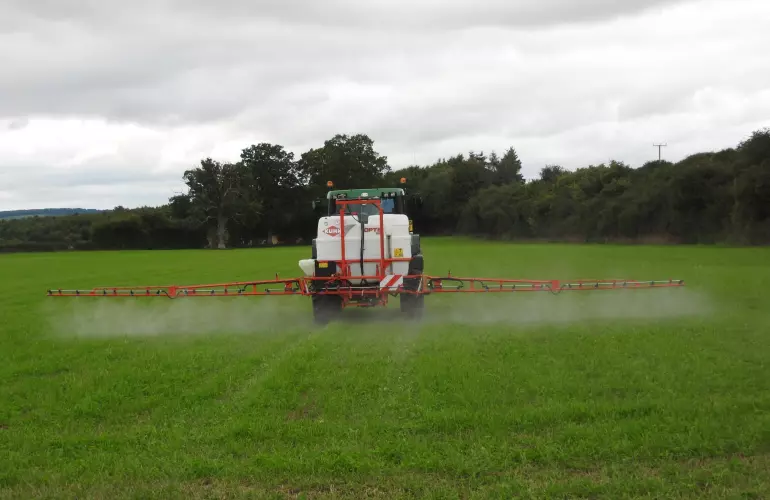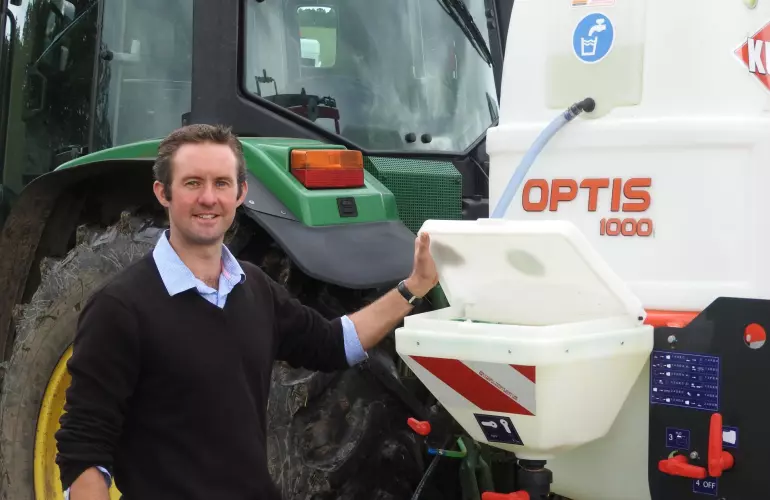Controlling pasture weeds such as docks, thistles and nettles is, for Chris Paddock, largely about timing.
“If we can spray at the right time, early in the spring when the target weeds are at the optimum growth stage, then we generally find we can stay on top of the problem,” he says.
It’s this that provides the perfect justification for the business to run it’s own sprayer - enabling them to pick their moment to go when the conditions for spraying are right and the weeds are at their most susceptible.

Chris, who farms at 170ha (420 acres) Burway Farm, Ludlow, with parents Philip and Nichola, recently upgraded to a Kuhn Optis mounted machine, with a 12 metre boom and 1,000 litre polyethylene tank, which makes a light and manoeuvrable unit when run on a 100hp John Deere 6310 tractor.
“There are a number of standard features on the new machine that we find particularly useful,” he adds. “Firstly, there’s the induction pipe that allows the tank to be filled really quickly straight from a pre-filled IBC. That’s a real practical benefit as we have low water pressure, so this saves a lot of time compared with filling from a hose.
Operationally, features such as hydraulic height adjustment and electronic in-cab control mean we can be more targeted in our spraying. At the same time, the configuration of a separate clean water hopper and an induction hopper makes filling and washing out safer and more straightforward than their previous machine, believes Chris.
“There are also fewer filters to maintain, with just one for each of three boom sections rather than one at each of the 24 jets, and road lights are fitted as standard,” he says.
Operationally, features such as hydraulic height adjustment and electronic in-cab control mean we can be more targeted in our spraying. At the same time, the configuration of a separate clean water hopper and an induction hopper makes filling and washing out safer and more straightforward than their previous machine, believes Chris.
“There are also fewer filters to maintain, with just one for each of three boom sections rather than one at each of the 24 jets, and road lights are fitted as standard,” he says.

Ease of operation and maintenance, alongside the ability to apply absolute timeliness to spraying operations, certainly helps to justify the Paddock family’s decision to own and operate their own machine. It also sits well with their philosophy of self-reliance, which applies right across a mixed farming enterprise that includes around 40ha (99 acres) of cereals and 130ha (321 acres) of grassland. The family maintains a 30-cow suckler herd, with half being pedigree Limousins, and buys in up to 200 store cattle. There is also a flock of 300 Texel-cross and Beltex-cross breeding ewes. All cattle and lambs are finished on the farm and mainly sold through Ludlow livestock market, where Burway Farm stock is renowned for its quality.
“We grow wheat and barley to feed at home and aim to maximise the productivity of our grassland to keep bought-in feed to a minimum,” explains Chris. “We run our own combine, round baler and small baler, and have our own ploughing, cultivation and drilling kit. As far as possible we operate without the need to call a contractor. As with the spraying, it means we can go when we need to go, to make best use of the good conditions when they arrive.”
